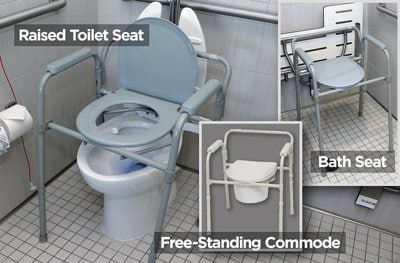Occupational Therapy: The skills of everyday Living
The Role of Occupational Therapy post-op:
If you are staying overnight, We will primarily be seeing you the day AFTER your surgery in the morning to complete education/training on the following:
- Any Hip Precautions / Movements to avoid during recovery
- Bed Mobility
- Self-cares (ex: Getting dressed, Bathroom Activity)
- Functional Transfers
- Functional Standing Balance and tolerance for everyday tasks
- Modified Home set-up to promote safety and independence
Total Hip Arthroplasty Precautions:
- Your Surgeon may give you certain Hip precautions to follow during your recovery. You may ask them what they may be prior to your surgery.
- Your Occupational Therapist will educate you on these precautions post-op followed by modified techniques, set-up, equipment needs to maintain your hip precautions, promote safety and independence.
- You will continue to follow these guidelines until cleared by your MD.
Things you can do PRIOR to Surgery / Home Safety Preparation
- Move Obstacles – Pick-up loose throw rugs, extension cords, footstools, space out furniture so you can easily move about with a rolling walker.
- Set-up of daily items at waist – shoulder height to avoid bending, over-reaching. It’s a good idea to carry a cell phone with you at all times during recovery.
- Home Improvement projects – Consider installing handrails or make sure existing handrails are secure; Proper Lighting
- Consider what chairs you have to sit on= avoid soft, low, and rolling chairs. Chairs with firm, straight back, and with armrests always help make it safe and easier to get up/down.
- May prepare food ahead of time, stock up on non-perishable items for simple meal prep; purchase paper plates, plastic ware.
- Set-up where someone can help you with garbage management, getting the mail, cleaning, laundry and cooking.
- If applicable, set-up for someone to assist you with any pet, childcare.
- Look into possible adaptive equipment and medical equipment.
- Arrange for someone to drive you after your surgery. Do NOT drive until cleared by your surgeon.
Adaptive Equipment:
- Lower Body self-cares can be challenging at first due to decreased weakness, movement, and various hip precautions.
- We recommend Comfy, loose, easy slip-on/off clothing.
- Dress your operated leg first.
- Undress your non-operated leg first.
- In order to get dressed independently, You will need to use long-handled equipment and a sock-aid. These can be purchased online or at medical supply stores as a ‘Hip Kit’.
Choosing Safe Footwear
Durable Medical Equipment
- Your Occupational Therapist will talk to you about your bathroom set-up and ways to adapt your bathroom to meet your needs during recovery.
- An elevated toilet or a 3-in-1 commode may be recommended to promote safety, maintain possible hip precautions and independence for your toilet transfer.
- The 3-in-1 commode can sometimes fit in your shower, as a shower seat.

Other Considerations
- Majority of our Patients do discharge home with no further Occupational Therapy needs. If we find you do have needs upon discharge we will make further suggestions for OT.
- May need assist with getting in/out of bed; do NOT recommend air mattresses.
Questions? Please write them down and we will address your needs after your surgery.
TOTAL HIP Joint Replacement Surgery Education-PDF